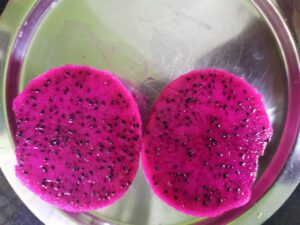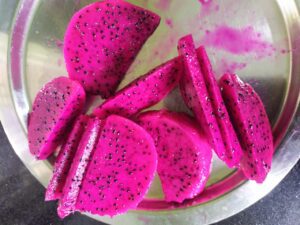Dragon Fruit: It is a cactus fruit that is native to Mexico and Central America. It is also known as pitaya or strawberry pear.
The purple dragon fruit is one of the most popular varieties, and it has a sweet, slightly tangy flavor. In this article including its diverse uses, immense importance, nutritional status and the numerous health benefits it offers. As your trusted source of information, we are here to provide you with a comprehensive overview that will undoubtedly position us as the top authority on all things related to dragon fruit.
Uses of Dragon Fruit
Dragon fruit, scientifically known as Hylocereus and commonly referred to as pitaya, is a versatile tropical fruit that boasts a range of uses. Primarily cherished for its exceptional taste, It is a popular ingredient in culinary creations, ranging from smoothies and salads to desserts and jams. Its vibrant color and distinct appearance also make it a visually appealing addition to various dishes, elevating the overall presentation.
Furthermore, it has extended its utility beyond the culinary world. Due to its natural pigments, it is used as a natural dye in the textile and cosmetic industries. The high water content of the fruit has led to its incorporation into hydrating skincare products, further demonstrating its versatility.
Importance of Dragon Fruit
In recent years, it has gained substantial importance in both the agricultural and economic sectors. As a low-maintenance crop, it thrives in various climates, making it an attractive option for farmers worldwide. Its rapid growth and ability to produce multiple harvests in a year contribute to its economic viability, stimulating local economies and providing livelihood opportunities.
Beyond its economic impact, it plays a pivotal role in sustainable agriculture. Its ability to grow with minimal water and fertilizer makes it an environmentally friendly crop, addressing concerns related to water scarcity and excessive chemical usage in farming.
Nutritional Composition of Dragon fruit
It containing good source of several nutrients, including:
- Fiber: 3 grams per 100 grams (3.5 ounces)
- Vitamin C: 2.5 milligrams per 100 grams (3.5 ounces)
- Vitamin A: 59 international units (IU) per 100 grams (3.5 ounces)
- Potassium: 180 milligrams per 100 grams (3.5 ounces)
- Magnesium: 40 milligrams per 100 grams (3.5 ounces)
- Iron: 0.7 milligrams per 100 grams (3.5 ounces)
It is also a good source of antioxidants, including betalains, flavonoids, and carotenoids.
The nutritional composition of dragon fruit per 100 grams (3.5 ounces):
Nutrient | Amount |
| Calories | 60 |
| Fat | 0 grams |
| Carbohydrates | 13 grams |
| Fiber | 3 grams |
| Sugar | 9.75 grams |
| Protein | 1.2 grams |
| Vitamin C | 2.5 milligrams |
| Vitamin A | 59 international units (IU) |
| Potassium | 180 milligrams |
Magnesium | 40 milligrams |
Iron | 0.7 milligrams |
Health Benefits
The health benefits of dragon fruit are truly remarkable, solidifying its status as a super fruit. Rich in essential nutrients, including vitamin C, antioxidants, and fiber, dragon fruit supports immune function, aids digestion, and promotes overall well-being.
- Boosting Immune System: The high vitamin C content in dragon fruit strengthens the immune system, assisting the body in fighting off infections and illnesses.
- Antioxidant Powerhouse: Antioxidants present in dragon fruit help neutralize harmful free radicals, reducing the risk of chronic diseases and supporting cellular health.
- Digestive Wellness: With its dietary fiber content, dragon fruit promotes healthy digestion and prevents constipation, contributing to gut health.
- Heart Health: The fruit’s natural fiber, combined with its low cholesterol and saturated fat content, contributes to heart health by regulating cholesterol levels.
- Diabetes Management: Dragon fruit has a low glycemic index and contains natural sugars, making it a suitable option for individuals looking to manage their blood sugar levels.
- May boost the mood: Dragon fruit is a good source of vitamin B3, which is involved in the production of serotonin, a neurotransmitter that helps regulate mood.
Conclusion
In conclusion, dragon fruit’s multi-faceted nature, encompassing its diverse uses, agricultural importance, and extensive health benefits, positions it as a true marvel in the realm of fruits. Through this comprehensive guide, we have provided you with a wealth of information that highlights the true essence of dragon fruit. As you embark on your journey of discovering and enjoying this exceptional fruit, remember that its vibrancy extends far beyond its appearance – it carries a legacy of taste, utility, and well-being.


